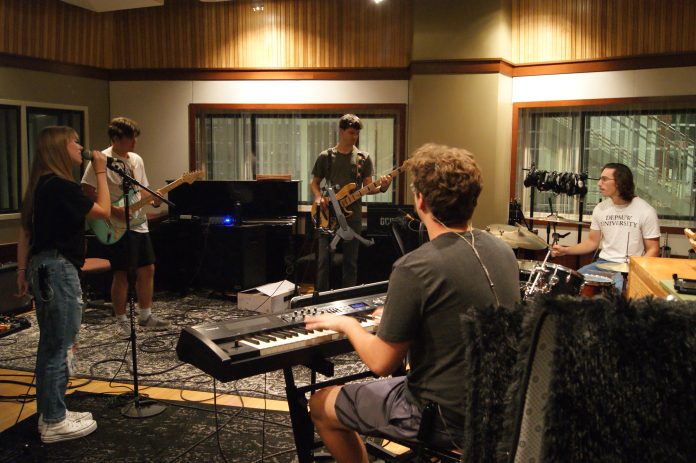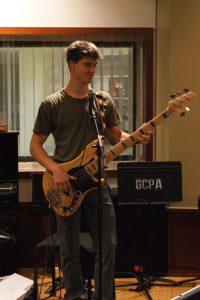
A five-person band at DePauw University holds big dreams and immense talent. With Sarah Cecil ‘26 as the lead singer, Nate Waggener ‘25 on bass, Sam Clayton ‘25 on drums, Ayden Boyd ‘25 on guitar and Max Riggle ‘25 on keys, they’ve got everything they need to be a killer band.
But they aren’t just a band — they’re writers and producers. The group released their debut single “Stump Removal” on Sept. 13. Writing, editing, recording, and producing the song was a tough yet fulfilling process. Cecil, Waggener, Clayton, Boyd and Riggle explained the journey from the first spark of an idea to releasing “Stump Removal” on Spotify. This is Boulder Watch.
Where do you start when writing a song?
Waggener: We compiled a list of demos that we wanted to do for an EP. (I myself) in the basement of my home on GarageBand wrote this demo and titled it “Stump Removal” because it sounded a lot like The Home Depot theme song. From there, it became an organic process of everyone throwing in their thoughts.
Clayton: A lot of individual musicians have a lot of individual talent, and it’s really cool seeing how they interpret and decide to put their own spin on things.
What’s the story or theme behind the lyrics of “Stump Removal”?
Cecil: I wrote most of the lyrics. We kind of brainstormed them together. The song itself definitely pushed me out of my lyrical comfort zone cause it’s very different from the songs that I normally write.
Waggener: It’s like this punky, grungy, angry song. We wanted to write something that was defiant, kind of angry, kind of sexy. It was just throwing lyrics at a wall and seeing what stuck.

How did you approach the songwriting for your first single? Was there a specific process or method you followed?
Waggener: The song itself started as a lick. The main riff of the song is what I sat down with that one night. In terms of revision, that’s all Max.
Riggle: In terms of revision, it’s actually really simple. You can tell what the song is calling for and what it’s not. So especially for the lyrics like in the first couple drafts, we would go and be like “huh, something’s not right there,” and then we’d change it.
Waggener: It was really just whatever we hated the least after like the 80th listen. When (Max) says “simple,” he means the actual recording of it, but mixing and mastering is long and tedious.
What was the recording process like?
Clayton: “Stump Removal” was recorded in a day. We got together at Echo Park's Studios in Bloomington, which is where John Mellencamp did his stuff. We spent about 20 hours in the studio that day and then immediately turned around and went to an Earth, Wind, and Fire concert.

Did you encounter any challenges during the recording process? If so, how did you overcome them?
Riggle: We recorded the bass parts 17 or 18 times. And then even after that, we were going back and saying, “I don’t think I played this note as well as I could have.” So after we recorded everything 17 or 18 times, we went in individually and dubbed everything. That part took a while.
What was the most rewarding part of working on this single?
Cecil: I think that at the end of the day — not to be sappy or anything — but these guys are my best friends, and just having something tangible of the time that I’ve gotten to play music with them is really nice.
Clayton: It’s still a little surreal looking at Spotify and seeing a picture of us. It’s not what I thought I’d be doing with my senior year, but I’m very happy that it is.
Who are your biggest musical influences, and how have they shaped your sound?
Riggle: I think two musicians that really encapsulate my inspiration on keyboard first would have to be the way Stevie Wonder plays, and I think a close second recently is Corey Henry. Just doing things that are complex and hard but also being simple and thoughtful in my playing is something that both of those people have really helped to shape the player that I’m becoming.
Boyd: For me, I would have to say John Mayer and Jimmy Hendrix. First of all, both of them are self-taught, which I am too. I haven’t taken a music lesson in my life. I just listen to a bunch of their music and copy their mannerisms. It’s completely transformed the way I play.
Do you have plans for more music in the near future?
Waggener: We got in there two weekends ago, and we recorded another song. Same exact process. It was (Aiden’s) demo this time. We got in there with a demo, and we turned it into a song. Just an arduous yet endearing process once again.
Clayton: I feel like that creative process was a lot smoother, getting in and out of that studio and figuring out what we as musicians needed to do to contribute to make this next single happen.
Is there anything else that you want people to know about?
Clayton: Stream “Stump Removal.”


